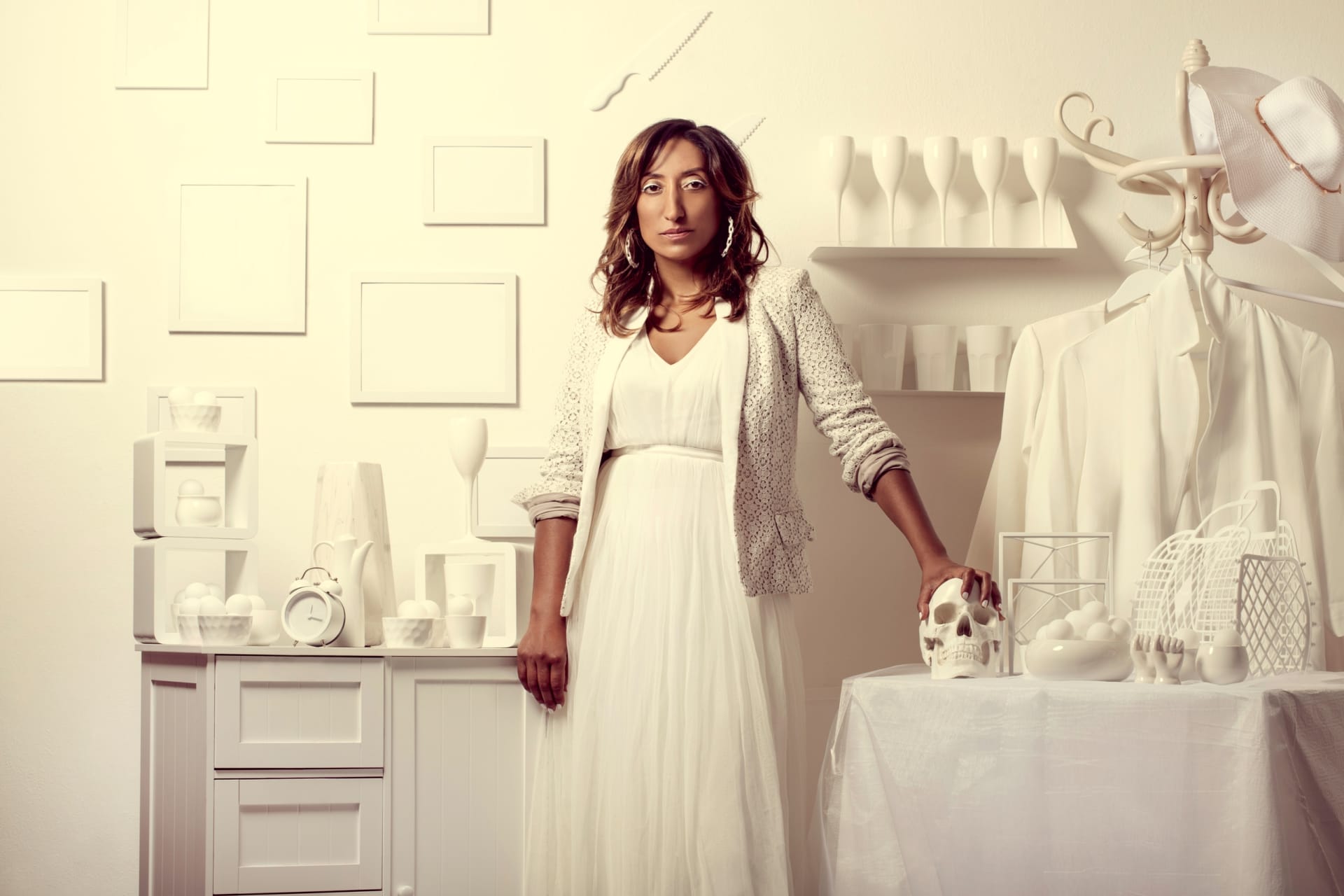Comedian Shazia Mirza was born allergic to bullshit. Her unrelentingly frank material about growing up in a conservative Muslim family struck a chord and has seen her tour the world with the word ‘brave’ following her every step of the way. Her new show, Coconut, will hopefully still make it to Oxford in June. Toby caught up with the former schoolteacher to find out what it’s like to be thrown into the limelight, why white feminism isn’t enough, and what it’s like doing comedy in a cave.
I wanted to ask first about teaching and comedy – I can think of a few people who have gone from one to the other – is there something there or is it a coincidence?
Listen, I taught in an East End comprehensive – it was absolutely horrific. There was drug dealing going on, there was stabbing going on, people let the tyres down on my car; it was really difficult. People used to swear at me – I used to teach 16-year-olds and they used to say to me, ‘God Miss, this lesson is shit, when is it going to end? When are you leaving?’ You know what? I have never stood on stage and had somebody go, ‘God this is shit, when are you leaving?’ Stand-up comedy is so much easier than being a teacher. Stand-up comedy is a day at the beach, it really is. Teaching was so hard. That’s why so many comedians have been teachers, because it’s so easy afterwards. Stand-up is like standing in front of a classroom but everybody’s listening to you already and they’re facing in the right direction – it’s amazing!
Quite early on in your comedy career, because you do material about Islam you experienced this phenomenon of suddenly being called on to speak about anything to do with Islam.
Apparently I was an expert on 9/11. Apparently I know who did it, why they did it and I was related to the people involved. Any time there was a terrorist issue they’d ring me up. I’d be like, ‘I’m a comedian, why are you ringing me up?’ ‘But you’re Muslim,’ they’d say – yeah, so? Not all Muslims are terrorists, not all terrorists are Muslims, it was such a weird thing. I was always getting asked to be this spokesperson about being Muslim, being a woman, on any race issue. It’s so boring. I knew nothing about it and I wasn’t interested in it, I just wanted to be funny. Then when I was funny, they’d say, ‘Why are you being funny? This is a serious issue!’
There’s a kind of catch-22 – damned if you do, damned if you don’t. I saw you on Loose Women and Jane Moore did this exact thing.
I know!
‘I just want the Muslim community to come and talk about it.’
And then she went, ‘Why are you doing this behind closed doors?’ Then she said something to me about my mum wearing the burqa. I said my mum wears the burqa because she doesn’t want to be seen with my dad – and Jane Moore said something like, ‘But don’t you ever say to your mum, why are you wearing that? Just take it off.’ She said that to me on air and I just thought, I’m a comedian, you’ve brought me on here, I’m being funny and you don’t like it. You want to ram these serious issues down my throat like I’m a politician or something.
It seems to be like this performance that liberally-minded white people do, and white feminists in particular.
Yeah it’s true, and that’s why I think feminism is such a white women’s game. White women are benefiting from this. White women are doing really well, they have a voice. Muslim women are still oppressed; we still don’t have a voice. Our prime minister makes jokes about the way we dress. We’re still a national joke – no wonder we don’t speak up. White women are a spectrum, they’re represented as a range – they’re glamour models, they’re newsreaders, they’re prime ministers. Muslim women, there’s only two of us, we either bake cakes or blow things up, there’s nothing in between. What privilege to be represented as who you really are. White women have that privilege, we don’t. We are just a stereotype and we don’t have a voice at all.
Your last show about the ‘Jihadi brides’, The Kardashians Made Me Do It, was an example of bringing some nuance to that stereotype.
Yeah they were normal girls. Honestly, I don’t believe they really cared about religion or politics; they were 15-year-old girls. They saw these men, they fantasised about them, and they thought they were gorgeous and hunky and they just went over there. It was all sexual, but the west refuses to believe that.
And then Shamima Begum was stripped of her citizenship.
Yeah right, by one of my own people. My show Coconut is partially based on Sajid Javid, we call him a coconut because no previous British home secretary had ever revoked anybody’s passport. David Blunkett didn’t, Jack Straw didn’t, even Theresa May didn’t, and along comes uncle Sajid Javid. He’s the first British-Asian home secretary, he revoked her passport and I thought, of all home secretaries you should have been the most understanding. You’re from the same religion as her, you’re from the same culture, you would have known her background, you would have understood why she went – why did you revoke her passport? It’s because you wanted to be seen to be whiter than the white people, more British than the British and you didn’t need to do that. They don’t want any more immigrants in this country – well what are you then? Priti Patel wants to bring back hanging – this is medieval, even the white people don’t think like this.
When one of our people has a position of power we have to go overboard with it because we feel like, ‘Oh my God, we need to be accepted.’ But we’re never going to be accepted in the way that white people are, because we’re not white. That’s partly what Coconut’s about, having loyalty to your own people.
Do you think this it is a common thread between second-generation immigrant experience, being caught between competing notions of assimilation and heritage?
This idea of pulling the ladder behind you is nothing new. Thatcher did it to women, Thatcher did it to working class people. Sajid Javid has done it to brown people, Kanye West has done it to black people. It’s a mentality and an attitude and it’s to do with being an immigrant. You always feel like you’re going to lose your place if you don’t go further than you’re meant to. It’s about survival – you have to be better than the others in order to survive. But actually, if you help your own people, that makes it stronger for us all to survive. People don’t see that, they just think of themselves.
I’m conscious that I’m talking to a comedian about all this – why is it that it falls to comics to be ‘brave’?
I don’t understand that. A lot of comedians get called brave. It’s not just me, I’ve heard Frankie Boyle being called brave, Jimmy Carr as well. I’m not saving anyone’s life, but as a stand-up comedian you can say anything you want and then just say, ‘It’s a joke.’ You can say anything about race, religion, gender, sexuality, rape, famine, war, death – I’ve heard jokes on all those things. A normal person in a normal job can’t just say anything and so they view us as brave, but actually this is our job. This is what we’re meant to be doing.
You’ve toured internationally more than any comedian I’ve spoken to.
I think that was because of 9/11. When 9/11 happened it was a global event and overnight I became this global comedian. I’ve been to China, all over Scandinavia, Pakistan, India, Holland, Germany, France, Italy, Spain. I’ve been to countries where English isn’t even their first language and I’ve managed to do comedy there. It didn’t always go great – I remember performing in Germany and they just stared at me; they didn’t know what I was doing. It’s true that humour’s not always translatable. There’s such a thing as a British sense of humour, and you know people say that Germans don’t have a sense of humour – they do, it’s just their own. But comedy can translate depending on what you’re talking about. I’ve had to slow down my speech and change words, but I performed in Kosovo once in a cave with a Swedish comedian. They went on and did an hour, then I had to do an hour – in a cave in Pristina full of American and British army officers. There was no electricity, no light, no microphone, it was absolutely freezing cold and I stood in this cave and did comedy there. I got some laughs which was amazing – not for the material, but for the situation and what I made of it. But you know, people want to laugh, especially in a dire situation.
For tour dates and any updates see shazia-mirza.com.










